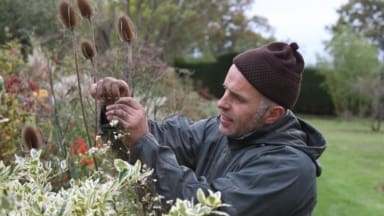
For the 2024, National Garden Scheme’s Annual Lecture, speaker Fergus Garrett of Great Dixter, will reveal how vital biodiversity can thrive in anybody’s cultivated garden patch, using evidence gathered from the world-famous garden under his care. The lecture, entitled Gardening for the Future, takes place on the 26th of November and can be attended in person at the Garden Museum, or online via live-stream. All proceeds from ticket sales will go to the NGS beneficiaries.
Great Dixter is one of Britain’s most famous gardens, for many years revered and admired for balancing its heritage with being in the vanguard of gardening trends and looking to the future. As we begin to realise the impact our garden environments can have on reversing the decline in our nation’s biodiversity, close study of the various areas at Great Dixter have produced interesting new evidence. Garrett, Chief Executive of the Great Dixter Charitable Trust, and hands-on head gardener, will reveal all that was discovered and talk about the positive implications for all gardeners.
Garrett studied horticulture at Wye College, University of London and was appointed as Head Gardener of Great Dixter in 1993. He is now CEO of The Great Dixter Charitable Trust. Among other honours, Garrett has been bestowed the Royal Horticultural Society Associate of Honour (2008), the Veitch Memorial Medal for outstanding contribution to the practise of horticulture (2015), and The Victoria Medal of Honour (2019) – the highest accolade given to British Gardeners by the Royal Horticultural Society.
In addition, Garrett has also has received many national and international awards for his work in education, horticulture and biodiversity. His interest lies in plant associations and communities in the wild, biodiversity, meadow gardening, layered planting, as well as peasant and artisan life, and the training of the young.

